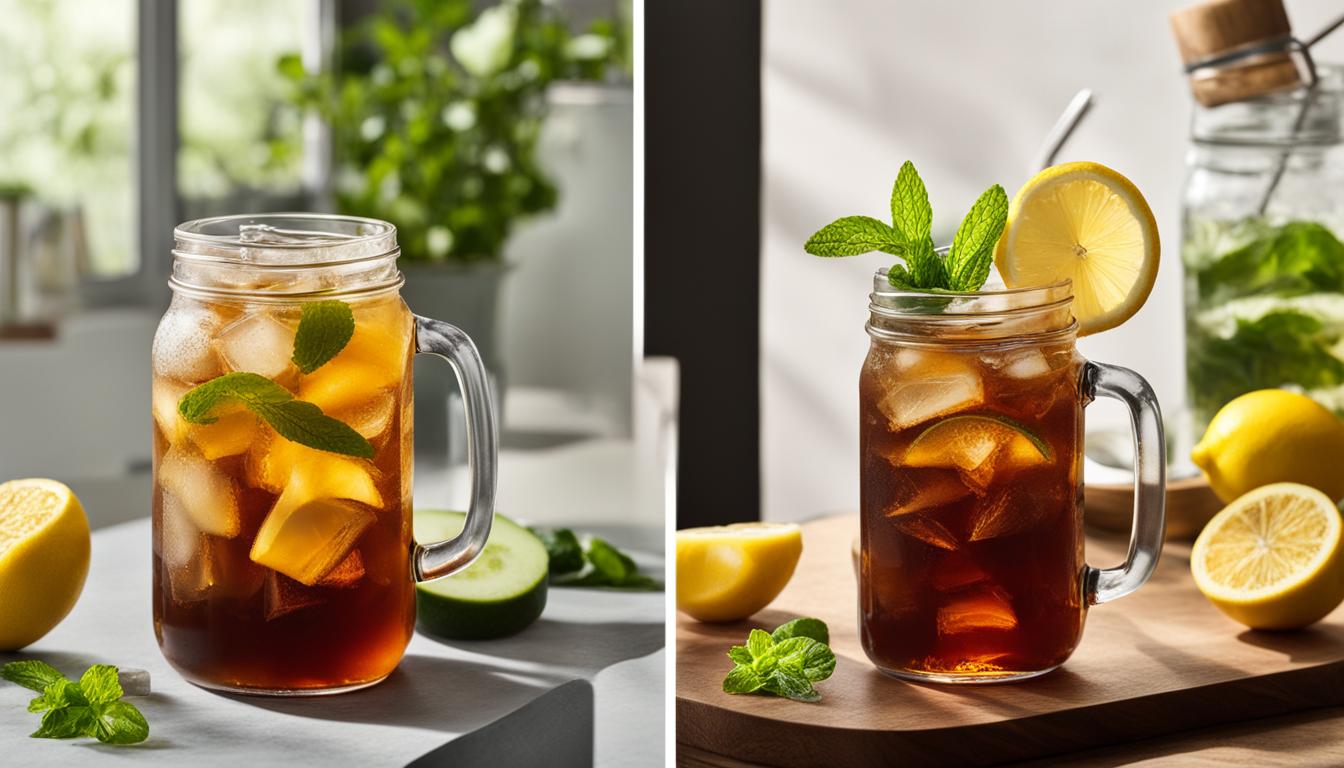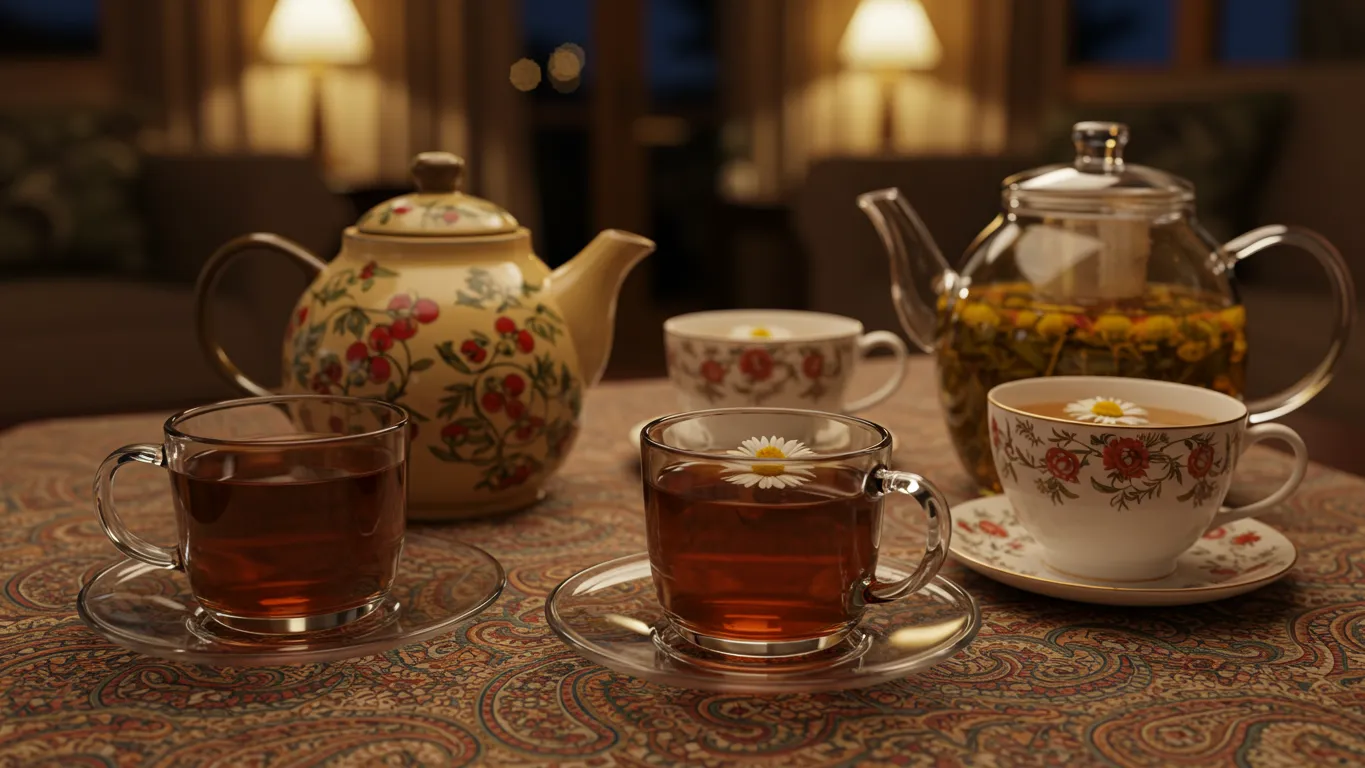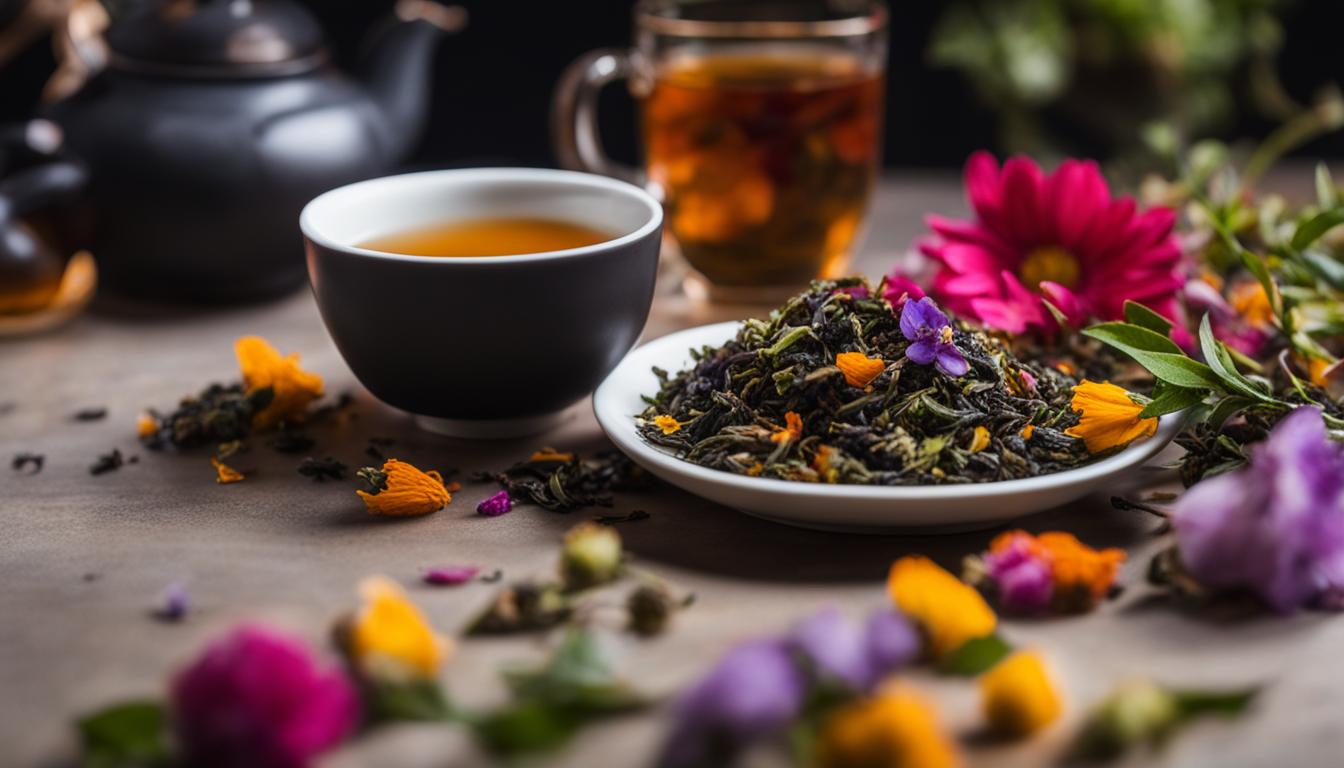Welcome to our comprehensive comparison of iced tea and cold brew tea, two popular options for enjoying a refreshing beverage during the summer months. As the temperature rises, nothing beats a cool and revitalizing drink to beat the heat. But which brewing method should you choose? Join us as we dive into the differences between iced tea and cold brew tea, exploring their unique taste profiles and health benefits.
Key Takeaways:
- Differences between iced tea and cold brew tea
- The flavor profiles of traditional iced tea and cold brew tea
- The health benefits of both brewing methods
- Preparation and brewing time for iced tea and cold brew tea
- Tips for choosing the right option based on your preferences
Traditional Brewing Method: Iced Tea
When it comes to enjoying a classic glass of iced tea, the traditional brewing method is the way to go. This method involves steeping tea leaves in hot water and then serving the brewed tea over ice or chilling it in the refrigerator. The result is a stronger and more pronounced flavor profile that is sure to quench your thirst on a hot summer day. However, it’s important to note that brewing traditional iced tea requires some finesse to avoid any bitterness or astringency.
The flavor of traditional iced tea can vary depending on several factors. The type of tea used, such as black, green, or herbal, will influence the taste. The water-to-tea ratio and the brewing temperature also play a role in determining the flavor profile. Generally, a higher tea-to-water ratio and a longer steeping time will result in a bolder and more robust taste. It’s important to experiment with different variables to find the perfect balance and create a flavor that suits your preferences.
To better understand the flavor profile of traditional iced tea, let’s take a look at the table below:
| Tea Type | Flavor Profile |
|---|---|
| Black Tea | Bold, robust, and sometimes slightly bitter |
| Green Tea | Grassy, vegetal, and slightly astringent |
| Herbal Tea | Varies depending on the herbs used; can be sweet, floral, or fruity |
As you can see, the flavor of traditional iced tea can be diverse, offering a range of tastes to suit different preferences. Whether you prefer the boldness of black tea, the freshness of green tea, or the unique flavors of herbal tea, the traditional brewing method allows you to create a refreshing and flavorful glass of iced tea.
Cold Brew Method: Cold Brew Tea
When it comes to the cold brew method, steeping tea leaves in cold or room-temperature water for a prolonged period of time is the key. This slow and gentle extraction process allows the tea leaves to release their flavors without the bitterness and astringency that can be present in traditional iced tea. The result is a smooth and refreshing cup of cold brew tea that is often described as having a sweet and clean finish.
Unlike traditional iced tea, which can sometimes be overpowering in flavor, cold brew tea offers a more delicate and aromatic taste experience. The longer brewing time allows for the extraction of the tea’s natural flavors without the risk of over-extraction, resulting in a milder and more enjoyable beverage. Whether you prefer black, green, or herbal teas, the cold brew method can enhance the overall taste profile, bringing out the subtle nuances of the tea leaves.
Cold brew tea also has a distinct advantage when it comes to its texture. The slow steeping process extracts fewer tannins, resulting in a drink that is smoother on the palate. This makes cold brew tea an excellent choice for those who find traditional iced tea too bitter or astringent. The smooth texture of cold brew tea makes it a perfect beverage to enjoy on its own, or it can be customized with added flavors such as lemon, mint, or fruit for a refreshing twist.
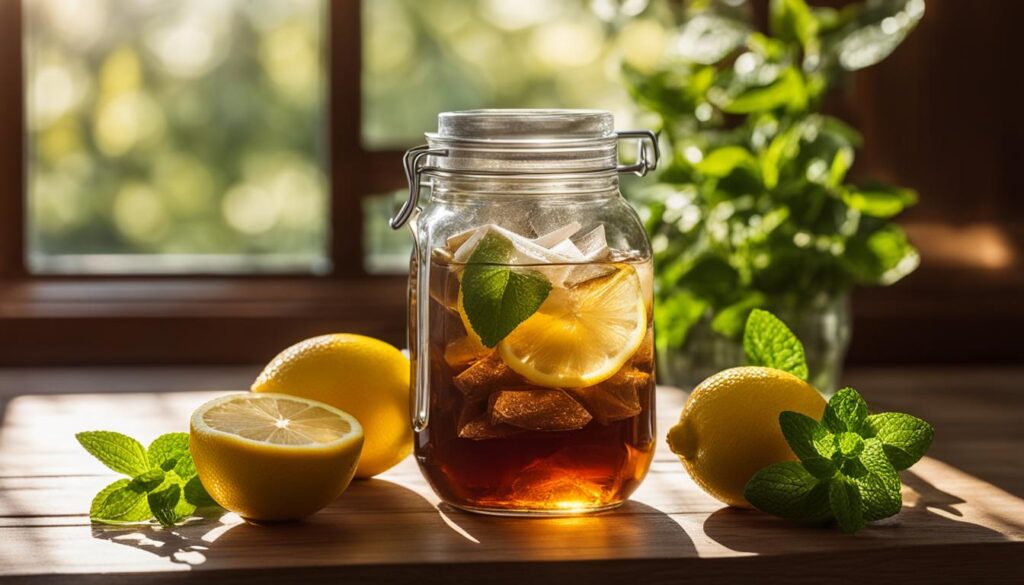
Table: Cold Brew vs Traditional Iced Tea
| Cold Brew Tea | Traditional Iced Tea |
|---|---|
| Smooth and refreshing | Bolder and stronger flavor |
| Less bitterness and astringency | Potential bitterness and astringency |
| Gentle and aromatic taste | Pronounced flavor profile |
| Long brewing time | Quick brewing process |
So, whether you’re looking to enjoy a tea that is smooth and refreshing or one that packs a bold flavor punch, cold brew tea is an excellent option. The cold brew method brings out the best in tea by preserving its delicate flavors and minimizing any bitterness or astringency. Experiment with different types of tea and brewing times to find your perfect cup of cold brew tea and savor the smooth texture and nuanced taste it brings.
Taste Comparison: Iced Tea vs Cold Brew Tea
When it comes to taste, iced tea and cold brew tea offer distinct flavor profiles that cater to different preferences. Iced tea, brewed using the traditional method, tends to have a bolder and stronger flavor compared to cold brew tea. The hot water steeping process extracts more tannins, resulting in a more pronounced astringency and bitterness. This robust flavor can be enjoyed by those who prefer a more intense and full-bodied taste in their tea.
On the other hand, cold brew tea boasts a smoother and milder taste. The slow and gentle extraction process, achieved by steeping the tea leaves in cold or room-temperature water over an extended period, results in a tea with less bitterness and astringency. Cold brew tea offers a cleaner finish and a more delicate flavor profile, allowing the natural characteristics and aromas of the tea leaves to shine through. It is a popular choice among those who prefer a refreshing and subtly sweet tea experience.
Both iced tea and cold brew tea have their own unique appeal. The choice between the two ultimately depends on your personal taste preferences. If you enjoy a bold and robust tea with a stronger flavor, traditional iced tea is the way to go. If you prefer a smoother and more refreshing tea with milder notes, cold brew tea is the perfect choice. Experiment with both methods and discover which one satisfies your palate the most.
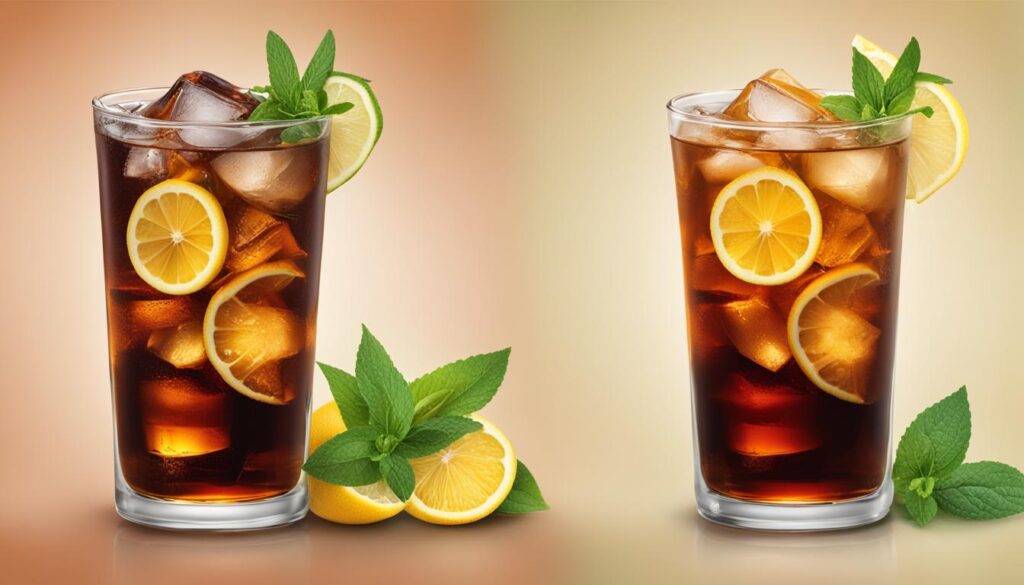
Table: Taste Comparison
| Iced Tea | Cold Brew Tea | |
|---|---|---|
| Taste | Bolder and stronger flavor with pronounced tannins and astringency | Smoother and milder taste with less bitterness and astringency |
| Finish | Can be slightly astringent with a robust aftertaste | Clean and refreshing with a subtle sweetness |
| Flavor Profile | Intense and full-bodied | Delicate with natural tea characteristics |
Health Benefits: Iced Tea vs Cold Brew Tea
When it comes to health benefits, both iced tea and cold brew tea have their advantages. Both beverages are packed with antioxidants, which are known for their ability to fight free radicals and reduce the risk of chronic diseases. However, the brewing method can affect the antioxidant content and overall health profile of the tea.
Cold brew tea, with its longer steeping time and lower temperatures, has been found to retain higher levels of certain antioxidants compared to traditional iced tea. The slow extraction process allows for a more gentle release of these beneficial compounds, resulting in a potentially higher antioxidant concentration in the final beverage.
It’s important to note that the specific health benefits may vary depending on the type of tea used. For example, green tea is known for its high levels of catechins, a type of antioxidant that has been linked to numerous health benefits, including improved heart health and reduced inflammation. Black tea, on the other hand, contains theaflavins and thearubigins, which have been shown to have anti-cancer properties and may help lower cholesterol levels.
Ultimately, whether you choose iced tea or cold brew tea, both can be enjoyed as part of a healthy lifestyle. Remember to consume tea in moderation and use it as a complement to a well-balanced diet and regular exercise.
Preparation and Brewing Time: Iced Tea vs Cold Brew Tea
When it comes to preparing and brewing iced tea and cold brew tea, there are significant differences in the time and effort required. Traditional iced tea can be made relatively quickly, while cold brew tea requires a longer steeping process. Let’s take a closer look at the preparation methods for these two refreshing beverages.
Iced Tea
To make traditional iced tea, start by boiling water and steeping tea leaves in hot water for a few minutes. Once the tea has reached the desired strength, it can be poured over a glass filled with ice or chilled in the refrigerator. This process typically takes about 10 to 15 minutes from start to finish, making it a quick and convenient option for those who want to enjoy iced tea without much waiting time.
Cold Brew Tea
Cold brew tea, on the other hand, requires a longer brewing time to extract flavors slowly and create a smoother taste profile. To make cold brew tea, simply place tea leaves in a pitcher or container filled with cold or room-temperature water. Let it steep for several hours or overnight in the refrigerator to allow the tea to infuse gently. The extended brewing time results in a more delicate and refreshing flavor. While the steeping process may take longer, the hands-on preparation time is minimal, making it an easy option for those who plan ahead.
| Iced Tea | Cold Brew Tea | |
|---|---|---|
| Preparation Time | 10-15 minutes | Minimal (overnight steeping) |
| Hands-on Time | Short | Minimal |
| Total Brewing Time | 10-15 minutes | Several hours to overnight |
As shown in the table above, traditional iced tea has a shorter overall brewing time compared to cold brew tea. However, cold brew tea requires less hands-on time and allows for a more hands-off approach to preparation. Consider your schedule and preferences when deciding which method works best for you.
So, whether you’re in the mood for a quick and bold iced tea or a smooth and refreshing cold brew tea, there’s a brewing method to suit your taste and time constraints. Experiment with different teas and brewing techniques to find your perfect summer sip. Cheers!
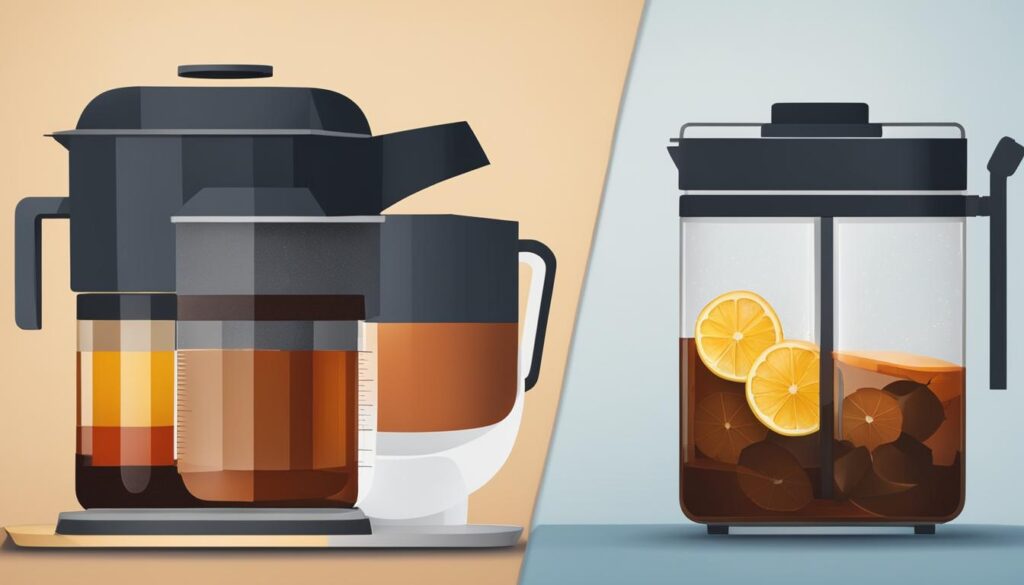
Conclusion
So, there you have it! The battle of iced tea vs cold brew tea has come to a close, and it’s time to make your decision. When it comes to choosing the right option, it all boils down to your personal preferences.
If you’re a fan of bold flavors and don’t mind a quicker brewing process, traditional iced tea is the way to go. With its strong and pronounced taste, it’s perfect for those who like their tea with a punch. On the other hand, if you prefer a smoother and more refreshing experience, cold brew tea is your best bet. Its gentle extraction process results in a milder and cleaner flavor profile that will leave you wanting more.
Don’t forget to consider your time constraints and health goals as well. If you’re short on time and need your tea fix ASAP, traditional iced tea is the quicker option. However, if you’re looking to maximize the antioxidant content and embrace a more relaxed brewing process, cold brew tea is the winner.
Ultimately, the choice is yours. Experiment with different teas, ratios, and brewing methods to find your perfect cup. Whether you’re sipping on a refreshing glass of iced tea or indulging in the smoothness of cold brew tea, we hope your summer is filled with delicious and satisfying sips. Cheers to a refreshing summer!
FAQ
What is the difference between iced tea and cold brew tea?
Iced tea is made by steeping tea leaves in hot water and then chilling it, while cold brew tea is made by steeping tea leaves in cold or room-temperature water for an extended period of time.
How does the flavor of iced tea and cold brew tea differ?
Iced tea has a bolder and stronger flavor with more pronounced tannins and astringency, while cold brew tea has a smoother and milder taste with less bitterness and astringency.
Are there any health benefits to drinking iced tea or cold brew tea?
Both iced tea and cold brew tea offer health benefits, with cold brew tea retaining higher levels of certain antioxidants due to the longer brewing time and lower temperatures.
How long does it take to prepare iced tea and cold brew tea?
Iced tea can be prepared in a matter of minutes, while cold brew tea requires steeping for a longer period of time, often overnight.
Which brewing method should I choose?
The choice between iced tea and cold brew tea depends on your taste preferences, time constraints, and desired health benefits. Experiment with different teas and brewing methods to find your favorite!

